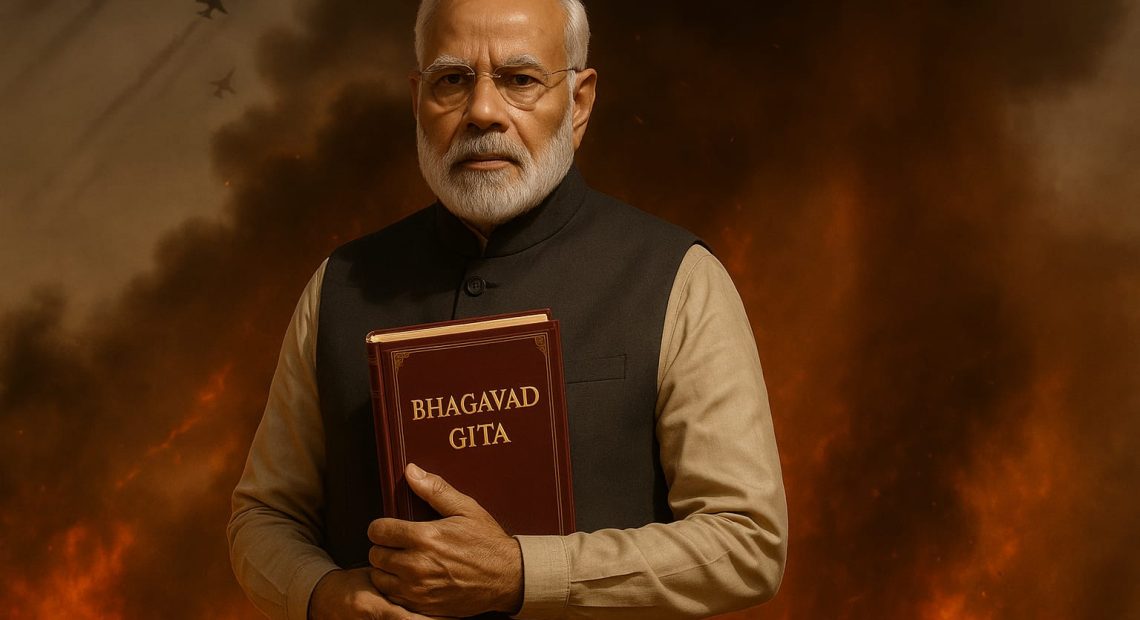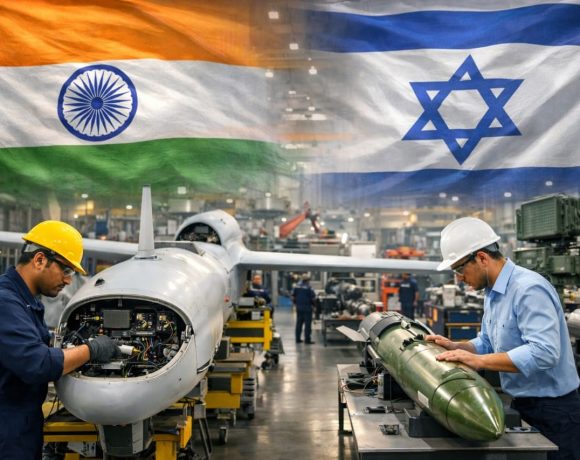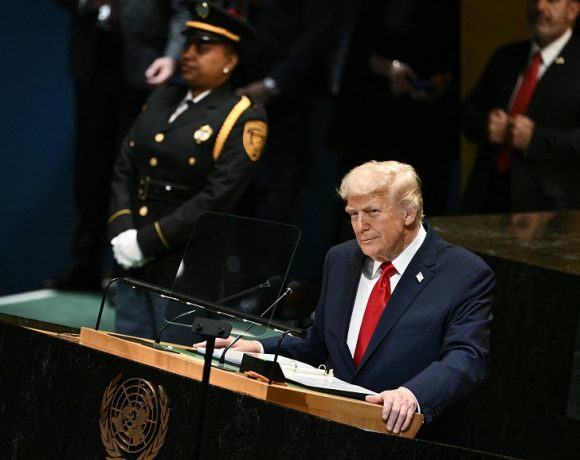
India Must Learn from Gita, Not Gandhi, to Defeat Pakistan
On the night of Pakistan’s latest cross-border provocations, Indian radar operators noticed something deeply disturbing: alongside drone swarms and missile launches targeting civilian areas, Pakistan had kept commercial airliners in the skies—shielding their terror acts with innocent lives. This wasn’t just a breach of warfare conventions—it was a display of moral bankruptcy. And yet, India responded with calm, restraint, and surgical language about civilian safety. It’s a script we know too well.
This brings us to a deeper dilemma—one that echoes across millennia. In the Bhagavad Gita, Arjuna stood paralyzed on the battlefield, doubting the righteousness of war against his kin. Lord Krishna didn’t coddle him. He didn’t tell him to remain passive. He told him to rise, to fight, and to fulfill his dharma. Because when survival is at stake, morality isn’t about retreat—it’s about resolve.
India’s military, unlike Pakistan’s, has always taken pride in being apolitical, humane, and ethical. But what happens when the enemy is none of those things? What happens when moral high ground becomes a graveyard? What happens when a scoundrel who fights dirty stays alive, while a proud, noble soldier dies—honoured, yes, but defeated?
This is not a call to lose our soul. It’s a call to wake up and understand the rules of the war we’re already in.
India’s Army: Honourable to a Fault
The Indian Army is often described as one of the most disciplined and morally upright military forces in the world. It does not swear allegiance to a religion or a political party, but to the Constitution. In every theatre—from Kashmir to Kargil to the Northeast—it has demonstrated a code of conduct that many Western democracies admire but rarely emulate.
Even in war, India has held itself back. During the 1965 conflict, Indian forces had advanced deep into Pakistan’s territory and were on the verge of taking Lahore. But in the name of peace and international pressure, we stopped. In 1971, we won decisively, captured 90,000 Pakistani soldiers, and still released them unconditionally after the Simla Agreement. In Kargil, we didn’t cross the Line of Control, despite heavy casualties.
The modern era hasn’t changed much. After the horrific 26/11 attacks in Mumbai, the Indian military stood down under the government’s decision not to escalate. The surgical strikes in 2016 and the Balakot airstrikes in 2019 were heralded more for their restraint than their impact. Civilians were warned, targets were carefully chosen, and India took pride in not killing innocents—even when Pakistan made no such distinctions in its provocations.
Our generals speak not in the language of vengeance, but of values. Our soldiers rescue civilians during floods, vaccinate villagers in conflict zones, and carry wounded enemy soldiers to safety. But here lies the question that haunts our security doctrine: can you win a war with moral purity, when your enemy has none?
India continues to believe that its restraint earns it respect. But what if the world has stopped admiring decency, and only fears decisiveness?
Pakistan’s Army: A Terror Cartel in Fatigues
If the Indian Army is a secular institution driven by constitutional values, the Pakistani Army is a feudal mafia draped in state-sanctioned jihadism. Over the decades, its generals have not only subverted democracy at home but actively nurtured terrorism as a pillar of foreign policy—especially against India and Afghanistan. This is not speculation. It’s documented history.
Consider the man currently acting as the face of Pakistan’s military propaganda machine: Lieutenant General Ahmed Sharif Chaudhry, Director General of ISPR. His father, Sultan Bashiruddin Mahmood, was not just any nuclear scientist—he was a UN-sanctioned individual who co-founded Ummah Tameer-e-Nau, an organization linked to the Taliban and Al-Qaeda. He held documented meetings with Osama bin Laden and Mullah Omar, allegedly discussing nuclear capabilities. Yet his son sits at the heart of Pakistan’s military communication, issuing moral lectures to the world.
He is not alone. The late General Hamid Gul, former ISI chief, was openly known as “the Godfather of the Taliban.” He once declared that jihadists would soon raise the green Islamic flag in Delhi. Brigadier Ali Khan was detained in 2011 for his links to Hizb ut-Tahrir, a banned Islamist group aiming to establish a global caliphate. Major General Zahirul Islam Abbasi, another senior officer, once plotted a coup to replace Pakistan’s democracy with an Islamic regime governed by sharia law.
And what of the groups these men enabled? Lashkar-e-Taiba, responsible for the 26/11 Mumbai massacre. Jaish-e-Mohammed, which carried out the Pulwama bombing. Hizbul Mujahideen, long embedded in Kashmir Valley insurgency. Haqqani Network, the butcher of Kabul. Ummah Tameer-e-Nau, a terrorist front with nuclear ambitions. All operated, at various times, with the ISI’s blessing and the Army’s logistical support.
This is not a coincidence. It’s a culture. The Pakistan Army doesn’t separate terrorism from strategy—it incorporates it. It does not see itself as just the military of a nation, but as the sword-arm of a grand Islamic struggle. It’s a theological militia in military uniforms, dreaming of Gazwa-e-Hind while begging the IMF for survival money.
Pakistan’s problem is not one bad general or one rogue agency. Its entire military establishment is structurally, ideologically, and historically tainted. And the world knows it—but turns a blind eye.
A Country Built on Hate, Not Hope
While India’s political class debates ethics and diplomacy, Pakistan’s national psyche has been moulded by one singular obsession: the destruction of India. This isn’t fringe rhetoric—it’s institutional policy. Entire generations have been raised not on dreams of progress, but on fantasies of vengeance. From school textbooks to Friday sermons, the message is the same: India must be bled, cut, and humiliated—no matter the cost.
And the cost has indeed been staggering. Pakistan today is a country on the verge of collapse. Its economy is in ruins, with inflation hovering around 40%, foreign reserves barely enough for a few weeks of imports, and millions descending below the poverty line each year. Its healthcare system is non-existent in many rural areas, and cities regularly face power blackouts and water shortages. Malnutrition, stunted growth, and child labour are rampant. And yet, even as its own citizens beg for survival, the Pakistani state spends billions funding terror, missile programs, and jihadi propaganda.
This is not just financial mismanagement. This is moral decay. When your priorities as a nation are not bread and schools, but bombs and sermons about jihad, you’ve already declared war on your own future. The Pakistan Army is at the centre of this rot—siphoning foreign aid, funneling Gulf charity donations, and using Islamic solidarity to justify perpetual war.
Worse, they pretend this is religious duty. Gazwa-e-Hind, a medieval concept rooted in conquest and subjugation, is openly preached in Pakistani mosques and military academies. Donations for this cause flow in from across the Muslim world, disguised as zakat or humanitarian relief, but directed toward arming a crusade.
It would be laughable if it weren’t so dangerous. A failed nuclear state, collapsing internally, still believes it can bring India to its knees. Not because it has the strength—but because it has the will to cheat, lie, and bleed indefinitely. It is a nation fueled by fanaticism over food, revenge over reform, and hatred over humanity.
And we, in India, still think they deserve restraint?
The Burden of Being Better: India’s Mistaken Moral Superiority
In every confrontation with Pakistan, India has walked the extra mile to wear the badge of moral superiority. We strike only in retaliation. We plan “precision surgical operations.” We issue advance warnings. We even go on record to clarify that we “targeted only terrorists,” not Pakistani civilians. Our leaders proudly declare, “We are not like them.” And they’re right—we aren’t. But here’s the bitter truth: wars are not won by declarations of nobility.
Take Balakot. After the Pulwama suicide bombing killed 40 CRPF personnel, India struck back—but only against an isolated terror camp. The Indian Air Force reportedly avoided a larger offensive fearing civilian casualties. In reality, Pakistan didn’t just house Jaish-e-Mohammed militants—it shielded them with civilian populations, madrasa students, and the fog of deniability. And yet, we held back.
Why?
Because we fear being seen like them. We are obsessed with global opinion, terrified of headlines in the New York Times, or a UN resolution crafted by nations that stay silent when Indian soldiers are butchered. Our restraint isn’t just strategic—it’s performative. We fight with the weight of global judgment, while Pakistan fights with the single-minded goal of destruction.
What could we have done differently? A lot.
We could have escalated forcefully, targeting infrastructure that supports Pakistan’s terror ecosystem, not just the operatives.
We could have ceased all diplomatic niceties, cut airspace access permanently, and withdrawn from trade treaties.
We could have declared intent, not just action: that every attack will be met with overwhelming, disproportionate retaliation.
And perhaps most importantly, we could have stopped pretending that precision matters more than deterrence.
We chose image over impact. But when your enemy hides behind women, mosques, and civilian aircraft, precision becomes paralysis. Pakistan counts on our hesitation. And too often, we oblige.
It’s time we asked ourselves a hard question: Are we in the business of fighting wars or crafting press releases?
Israel’s Doctrine: No Apologies for Survival
When Israel’s survival is threatened, it does not call a press conference. It calls in an airstrike.
From the 1976 Entebbe rescue to its current operations against Hamas and Hezbollah, Israel has built a national doctrine that prioritizes self-preservation over public perception. It doesn’t seek international permission to defend its people. It doesn’t apologize when civilians die as collateral in the war zones its enemies create. And most critically, it doesn’t care if the world wags a finger. Because Israel understands something India has yet to absorb: you don’t win existential wars with restraint—you win them with resolve.
In 2023, when Hamas launched a brutal surprise attack killing over a thousand Israeli civilians, Israel responded not with “surgical strikes,” but with an unrelenting offensive that decimated terrorist strongholds in Gaza. The West wrung its hands, issued statements, demanded proportionality—but Israel didn’t flinch. It didn’t justify. It acted.
Israel’s moral clarity is rooted in a simple truth: it is the only Jewish state in a world that has tried to erase its people. India, the only Hindu-majority country on Earth, should know this feeling well. We too are surrounded by states and ideologies that dream of our fragmentation. We too face enemies who chant slogans of holy war and promise bloodshed until our last border is erased.
But unlike Israel, we still play by the rules of the international order that never defends us. We still seek validation from nations that were silent during Mumbai, Pulwama, Uri, and Pahalgam. We still believe that doing the right thing—as defined by foreign editorial boards—will somehow shield us from the wrath of a genocidal neighbour.
It won’t.
Israel survives because it acts without apology. It understands that no one will save you but yourself. India must learn the same lesson—not in whispers, but in doctrine, in strategy, and in blood if necessary. Our history is filled with righteous defeat. It’s time our future is filled with righteous defiance.
The Illusion of Allies: India Must Stand Alone
One of the most dangerous illusions in Indian strategic thinking is the belief that when the moment of truth arrives, we won’t be alone. That somehow, our long-standing friendships, defence partnerships, and global goodwill will translate into real support when we are under attack. But history—and cold, brutal geopolitics—says otherwise.
Russia, once considered a dependable partner, is now economically and strategically shackled to China, our most serious adversary. Its silence on issues like Pakistan-sponsored terrorism is deafening. The United States, for all its defence sales and lip service to democracy, is more interested in managing Pakistan than punishing it. France and Israel do provide us with cutting-edge weapons—but let’s not mistake a vendor-client relationship for an alliance. They sell us arms, not allegiance.
There is no military bloc that will back India in a war. There is no “Abrahamic NATO” for Hindu-majority India. And even the so-called “Global South” prefers to remain neutral, driven more by oil deals and trade routes than by any moral compass. When our soldiers bleed on the border, there will be no flotilla of Western carriers coming to our aid, no emergency UN summit that will deliver justice. There will only be us.
And this is not a tragedy. It is a truth—and one we must embrace. Because when you realize that you are alone, you start building your strength accordingly. You stop waiting for permission. You stop pretending that moral victories are enough. You start designing your defence and your diplomacy with the clarity that no ally is worth more than your own readiness.
India must stop pleading, start asserting. Stop briefing foreign envoys, start deterring enemy generals. The moral compass of the world spins erratically. Ours must point clearly—to Bharat’s survival, security, and sovereignty.
Conclusion: The Gita Was Always About War
In the first chapter of the Bhagavad Gita, Arjuna lowers his bow. He looks across the battlefield and sees friends, teachers, kin. His heart trembles. His spirit falters. He tells Krishna, “I will not fight.” What follows is not divine comfort—it is divine command. Krishna tells him that to abandon battle when dharma demands it is the greatest sin of all.
India today is Arjuna on the edge of Kurukshetra. We look across the border and see a failed state, armed with delusions of conquest and a history of betrayal. We see Pakistan flying drones into our cities, sheltering terrorists under civilian masks, and now, using commercial airplanes as shields to cover their cowardly attacks. And still, we hesitate.
We explain. We document. We issue dossiers and denials. We seek understanding in capitals that only understand force. We continue to play by rules, while our enemy rewrites the playbook with every new deceit.
This is not a call for rage. This is a call for clarity. The Gita does not teach us to hate. It teaches us to act—without attachment, without fear, and without apology.
The Indian Army does not need to mirror Pakistan’s depravity. But it must stop being its moral counterweight. Because the soul of India will not be saved by the restraint of its soldiers—it will be preserved by the courage of their conviction.
It is time we reminded ourselves that dharma is not passivity. Morality is not weakness. And survival is not sin.
We are alone. We are righteous. And we are ready.
Let our enemies learn what Arjuna learned—when the cause is just, war is not destruction. It is deliverance.


















